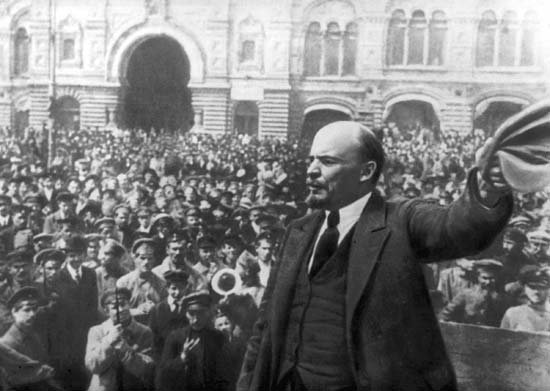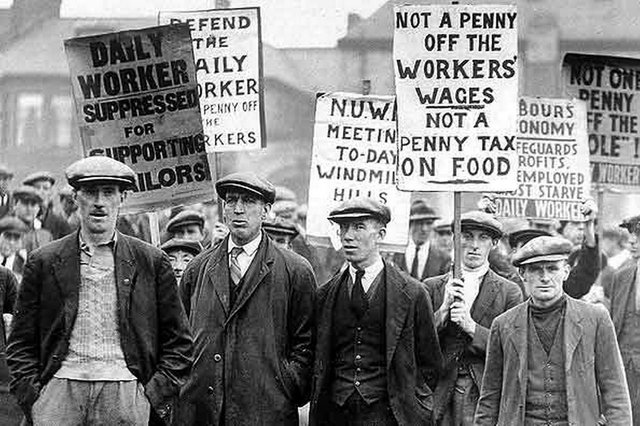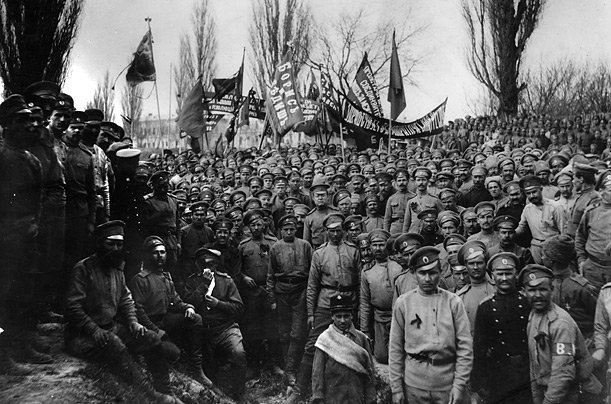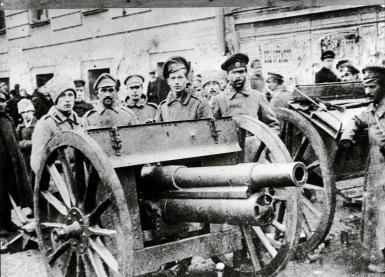The Russian Revolution

The 1917 Russian Revolution was not, the same number of individuals assume, one efficient occasion in which Tsar Nicholas II was toppled and Lenin and the Bolsheviks took control. It was a progression of occasions that occurred amid 1917, which involved two separate transformations in February and October (with a lot of political wranglings inbetween), and which in the long run dove the nation into Civil War before prompting to the establishing of the Communist State.
Developing Unrest
The principal real occasion of the Russian Revolution was the February Revolution, which was a disordered issue and the zenith of over a century of common and military distress. The reasons for this agitation of the average folks towards the Tsar and distinguished landowners are an excessive number of and entangled to conveniently outline, however key components to consider were continuous disdain at the coldblooded treatment of laborers by patricians, poor working conditions experienced by city specialists in the youngster mechanical economy and a developing feeling of political and social familiarity with the lower arranges when all is said in done (law based thoughts were achieving Russia from the West and being touted by political activists). Disappointment of the ordinary parcel was further aggravated by nourishment deficiencies and military disappointments. In 1905 Russia experienced humilating misfortunes in the Russo-Japanese war and, amid an exhibit against the war around the same time, Tsarist troops terminated upon an unarmed group - advance isolating Nicholas II from his kin. Across the board strikes, riots and the acclaimed rebellion on the Battleship Potemkin followed.
Such was the atmosphere in 1905 in certainty that Tsar Nicholas saw fit, without wanting to, to surrender the general population their desires. In his October Manifesto, Nicholas made Russia's first constitution and the State Duma, a chose parliamentary body. However Nicholas' faith in his awesome appropriate to decide Russia implied that he spent a significant part of the next years battling to undermine or strip the Duma of its forces and to hold however much absolutism as could be expected. (Current antiquarians may take note of that Russian rulers haven't progress significantly in the most recent hundred years!).
At the point when Archduke Franz Ferdinand was killed by political activists in Serbia in 1914, the Austro-Hungarian realm announced war on its neighbors. Serbia swung to Russia for offer assistance. Tsar Nicholas II saw an opportunity to stir his kin against a typical adversary, and to make up for the mortifications endured in the Russo-Japanese war. It didn't exactly work out be that as it may...
World War I

From multiple points of view Russia's terrible support in World War I was the last hit to Tsarist run the show. In the primary engagement with the Germans (who had agreed with the Austro-Hungarian Empire), the Battle of Tannenberg, the Russian armed force was extensively beaten enduring 120,000 losses to Germany's 20,000. A proceeding with arrangement of misfortunes and mishaps implied that Nicholas left St. Petersburg in the fall of 1915 to take individual control of the armed force. At this point Russia was sending recruits and untrained troops to the front, with next to zero gear and battling in a practically nonstop withdraw. In 1916 resolve achieved an unequaled low as the weight of pursuing the war fell hardest on prolaterian families, whose children were being butchered at the front and who serious endured sustenance and fuel deficiencies at home. The Tsar and the Imperial administration assumed the fault as common distress warmed up to breaking point.
The February Revolution (1917)

On 23rd February 1917 the International Women's Day Festival in St. Petersburg transformed into an expansive exhibit, as exasperated ladies specialists left processing plants to challenge sustenance deficiencies. Men soon went along with them, and on the next day - energized by political and social activists - the group had swelled and for all intents and purposes each industry, shop and endeavor had stopped to work as practically the whole masses went on strike.
Nicholas requested the police and military to intercede, however the military was no more extended faithful to the Tsar and numerous mutinied or joined the general population in shows. Battles broke out and the entire city was in disarray. On October 28th more than 80,000 troops mutinied from the armed force and plundering and revolting was broad.
Confronted with this untenable circumstance Tsar Nicholas resigned his position of royalty, giving energy to his sibling Michael. However Michael would not acknowledge authority unless he was chosen by the Duma. He surrendered the next day, leaving Russia without a head of state.
The Provisional Government

After the resignation of the Romanovs a Provisional Government was immediately shaped by driving individuals from the Duma and perceived universally as Russia's legitimate government. It was to lead Russia until races could be held. However it's energy was in no way, shape or form outright or stable. The more radical Petrograd Soviet association was an exchange union of laborers and officers that used gigantic impact. It supported full-scale Socialism over more direct equitable changes for the most part supported by individuals from the Provisional Government.
Following quite a while of Imperial control Russia was overcome with political intensity, however the a wide range of groups, all touting distinctive thoughts, implied that political soundness was still far off straightforwardly after February Revolution.
Lenin Returns to Russia
One individual quick to exploit the riotous situation in St. Petersburg was Vladimir Ilyich Ulyanov - otherwise known as Lenin. Lenin had spent the vast majority of the twentieth Century voyaging and working and crusading in Europe - incompletely out of dread for his own wellbeing, as he was known Socialist and adversary of the Tsarist administration. However with the Tsar in custody and Russian legislative issues in tumult, Lenin saw the chance to lead his gathering, the Bolsheviks, to control. From his home in Switzerland he arranged an arrival to Russia with the assistance of German powers. (As a defender of pulling back Russia from the Great War, the Germans were eager to encourage Lenin's entry back by means of a 'fixed prepare'.)
Lenin's arrival in April of 1917 was welcomed by the Russian masses, and in addition by numerous driving political figures, with incredible happiness and praise. Be that as it may, a long way from joining the touchy gatherings, he instantly censured the strategies and belief systems of both the Provisional Government and the Petrograd Soviet. In his April Theses, distributed in the Bolshevik daily paper Pravda, he pushed non-co-operation with the liberals (ie. non-hardline Communists) and a prompt end to the war.
At first his uncompromising position served to segregate Lenin and the Bolsheviks, however with effective trademarks like 'Peace, land and bread,' Lenin start to win the hearts of the Russian individuals - who were progressively not able to stomach war and neediness.
Summer of 1917
Amid the mid year of 1917 Lenin made a few endeavors to summon another unrest any semblance of which had occurred in February, with the point of ousting the Provisional Government. At the point when the Machine Gun Regiment declined to leave Petrograd (as St. Petersburg was then known) for the cutting edge Lenin tried to move them rather into making a putsch. However Kerensky, ostensibly the most critical figure of the time - an individual from both the Provisional Government and Petrograd Soviet - skillfully frustrated the upset. Experienced troops landed in the city to subdue any dissenters and the Bolsheviks were blamed for being in arrangement with the Germans. Numerous were captured while Lenin got away to Finland.
Notwithstanding this PR calamity Lenin kept plotting and conspiring. In the mean time Kerensky endured his own particular political difficulties and even needed to bid to the Bolsheviks for military guide when he dreaded his Minister of War, Kornilov, was going for a military tyranny. By harvest time the Bolsheviks were moving into the ascendency, winning greater part votes inside the Petrograd and Moscow Soviets. Leon Trotsky was chosen as president of the previous.
The October Revolution
(Nb. By the Julian Calendar utilized as a part of Russia at the time, the transformation partook in November 1917, and is hence frequently alluded to as the November Revolution)
With Russian governmental issues still in a condition of steady flux Lenin understood that now was an ideal opportunity to profit by his gathering's prominence. He arranged a rebellion that would oust the inexorably ineffectual Provisional Government and supplant them with the Bolsheviks. On October tenth he held an acclaimed meeting with twelve gathering pioneers, and attempted to induce them that an upset was required. Regardless of accepting the support of just 10 of them plotting proceeded.
October 24th was the date settled on, and on that day troops faithful to the Bolsheviks took up significant positions in the city, for example, the principle phone and transmit workplaces, banks, railroad stations, post workplaces, and real extensions. Protects dispatched by the Provisional Government, who had got twist of the plot, fled or surrendered without a battle. By the 25th October each key working in St. Petersburg was under Bolshevik control, aside from the Winter Palace where Kerensky and alternate Ministers were stayed with a little monitor.
At 0900 of that day Kerensky fled the Palace via auto, never to come back to Russia. On the 26th the Palace was brought with scarcely a shot discharged, and Lenin's October Revolution had been accomplished with the absolute minimum of dramatization or gore.
Outcome and Consequences
In spite of being permitted to seize control so effortlessly Lenin soon found that his support was a long way from outright. His Peace Policy with the Germans was especially disliked as it surrendered a lot of Russian region. Not long after the October Revolution, the Russian Civil War broke out between the "Reds" (Communists) and the "Whites" (Nationalists, Conservatives, Imperialists and other against Bolshevik gatherings). Following a ridiculous four year battle Lenin and the Reds won, setting up the Soviet Union in 1922, at an expected cost of 15 million lives and billions of roubles. In 1923 Lenin passed on and Stalin assumed control .
~ Thanking you
Ishan Pandey
source :- https://www.britannica.com/event/Russian-Revolution-of-1917
Pictures :- https://www.marxists.org/archive/jackson-ta/articles/1921/11/header.jpg
http://f.tqn.com/y/history1900s/1/W/f/N/1/russianrev1.jpg
https://media1.britannica.com/eb-media/78/121178-004-945062DD.jpg
I'm gonna follow you - more of this stuff and I will keep voting! Great post.
thank you very much for the support :D
please see the new content :-
https://steemit.com/history/@ishan-pandey/the-mongol-empire
One question or like a survey .
As a reader are you more interested in Ancient History , Medieval History or Modern History ?
also Would like to read about empires , civilizations or would prefer tales of Kings and Queens or Revolutionists ?
nice content !! Keep posting !!
One question or like a survey .
As a reader are you more interested in Ancient History , Medieval History or Modern History ?
also Would like to read about empires , civilizations or would prefer tales of Kings and Queens or Revolutionists ?
I like everything about history , just keep'em coming boy !!
Great post! Keep 'em coming.
thank you very much for the support :) Much appreciated :D
please see the new content and thank you for your support :D
https://steemit.com/history/@ishan-pandey/the-mongol-empire
One question or like a survey .
As a reader are you more interested in Ancient History , Medieval History or Modern History ?
also Would like to read about empires , civilizations or would prefer tales of Kings and Queens or Revolutionists ?
I enjoy all history. I prefer, at least lately, preindustrial revolution upwards and it's effects on so called Western Civilizations. I m trying to get an understanding of Quigley's "Tragedy and Hope" http://tragedyandhope.ning.com/
I am also an avid listener of Dan Carlin's History Podcast.